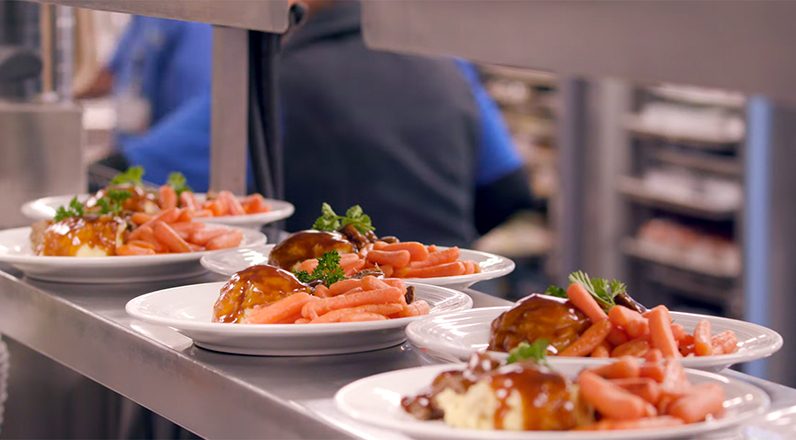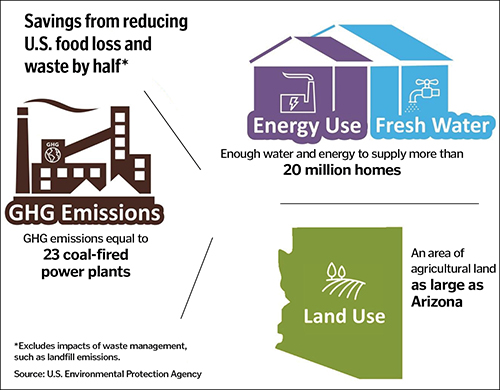
St. Joseph Medical Center in Tacoma, Washington, packages the day's surplus food from the hospital cafeteria. A courier then picks up and delivers it to three partner organizations. In the first six months of the edible food recovery effort, St. Joseph provided 895 meals.
A pilot initiative to tackle food insecurity while also reducing landfill waste is underway at St. Joseph Medical Center in Tacoma, Washington.
The medical center's system, Virginia Mason Franciscan Health, launched the edible food recovery effort in July. The project sends surplus food from St. Joseph's cafeteria to people who need it. The pilot program is an alliance between the hospital and three local partners, St. Leo's Food Connection, the Tacoma Rescue Mission and the Oasis Youth Center, that offer free hot meals.

"This is good food that would otherwise go to waste," says Doug Baxter-Jenkins, division director of community health at Virginia Mason Franciscan Health. "But the program gets the food to those who can use it right away."
Virginia Mason Franciscan Health is expanding the initiative to another hospital with plans to grow it more widely over the next year. Meanwhile, the system's parent, CommonSpirit Health, has a similar separate initiative underway at hospitals in San Francisco.

Virginia Mason Franciscan Health contracts with Goodr, a food waste solutions company. The company sends food containers and labels to the hospital, which packages the day's excess food. Main dishes range from chicken parmesan to spaghetti and meat sauce to beef pot roast along with side dishes and rolls. Every Monday, Wednesday and Friday, couriers pick up the filled containers and deliver them to partner organizations where the food is heated and served.
"So it's kind of like a DoorDash, really," Baxter-Jenkins says.
'An obligation and a privilege'
The two-year edible food recovery pilot is funded by a grant from CommonSpirit Health's Mission and Ministry Fund. It costs $576 a month for containers, labels, and 12 pickups and deliveries.
Goodr keeps track of the list of food destinations and contacts the locations to see which ones have the greatest need on a given day.
"The more we can impact food insecurity, the more we improve the health and resiliency of our community members," Christensen says.
The initiative doesn't require an undue amount of effort on the part of the hospital, according to Justin Lee, production manager of the St. Joseph dietary department. In addition to packaging the food, a hospital cafeteria employee uses an online system to keep track of how much and what kind will be picked up.

"Over a week, the job takes about three or four hours," Lee says.
The biggest challenge has been keeping enough containers and labels on hand. In October, delivery and receiving issues caused the cafeteria to run out of these essentials, prompting St. Joseph to pause the program. The hospital is still working out an optimal ordering schedule for these materials.
"If we don't have the labels, we just have to make our own, which takes a little bit longer," Lee says. "But if we don't have the containers, then we can't prepare the food for pickup."
Lee chalks up the difficulty to the growing pains of a new program. "It's nice to know the food is going where it's needed and not just being thrown away," he says.

In the first six months of the edible food recovery effort, St. Joseph provided 895 meals, while diverting 1,074 pounds of waste from landfills, according to Stephanie Christensen, a community engagement professional with Virginia Mason Franciscan Health.
Christensen is proud the program is making a difference in Pierce County, Washington, where St. Joseph is located, and where nearly one-third of the population experiences food insecurity.

"We're one of the major employers in Pierce County," Christensen says. "We have an obligation and a privilege to do this work, and to reduce the food waste in our community and address the environmental impact of food waste."
Program expansion
Edible food recovery is part of a larger Virginia Mason Franciscan Health strategy to increase food security. The system is also working to boost enrollment in the Supplemental Nutrition Assistance Program for low-income
families, improve the appeal of food banks and pantries, and deliver medically appropriate meals to heart patients every month.
"The more we can impact food insecurity, the more we improve the health and resiliency of our community members," Christensen says.
In January, Virginia Mason Franciscan Health launched a second edible food recovery program at St. Michael Medical Center in Silverdale, Washington. Plans are underway to expand to five more hospitals.
At the same time, Baxter-Jenkins says CommonSpirit Health is piloting another edible food recovery program in its San Francisco hospitals using a vendor called Replate. A California law requires that by 2025, institutions that produce food waste divert at least 20% of their excess edible food to places that will make it available for human consumption.
Eventually, CommonSpirit could divert surplus food away from landfills to people on a much larger scale, according to Baxter-Jenkins.
"CommonSpirit has hospitals in over 21 states," Baxter-Jenkins says. "There's no reason why we can't expand this partnership to more CommonSpirit hospitals that want to replicate it, or to provide technical assistance to other hospitals that are looking to set up their own programs."
Baxter-Jenkins points out that a side benefit of the edible food recovery program is better recordkeeping in hospital cafeterias.
"I think, ultimately, our food and nutrition leaders will be able to look at this data and adjust purchasing to lower our costs," he says.
But a chief goal of the program remains feeding people who need it, long a tradition among Catholic hospitals.
"One of the sisters on our board, Sister Jude, said that back in the 1970s, she and the other sisters would go to the loading dock every evening and give food to community members," Baxter-Jenkins says. "And now, we're doing the same thing but in a more modern way."
